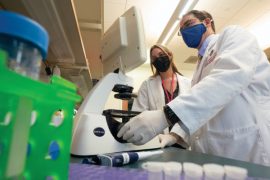Madison survivors share ways women can empower themselves
By Erin Hueffner
The minute after a breast cancer diagnosis, “normal” doesn’t exist. In the midst of swirling emotions, women have to make quick decisions with long-lasting implications. Start with chemotherapy or a mastectomy? If a mastectomy, opt for breast reconstruction or not? It helps to know someone who has been through the process—often more so for members of the LGBTQ community who may face additional stressors.
“I just wanted to feel better so I could be a mom again to my daughter,” says Jamie Steckelberg. She went ahead and had a skin-sparing mastectomy, allowing her to decide later about reconstruction. “What does that say about me as a woman, what does it say about society, that you’re just supposed to hurry up and have this reconstruction? There’s a movement of women reclaiming their bodies and going flat,” she says.
High prescription drug costs can be a barrier to some and insurance co-pays also add up quickly—if you have insurance to begin with. And when you’re missing work to get treatment, you worry about losing your job. All of this is magnified for the LGBTQ community. According to the Susan G. Komen Breast Cancer Foundation, lesbian, gay, and bisexual women have a higher risk of breast cancer than other women. Breast cancer risk factors such as alcohol use, childbirth later in life and obesity tend to be more common in LGBTQ women. Steckelberg says a fear of rejection by medical providers can deter women from seeking care in the first place.
“There’s always been a silence about who we are as lesbians,” says Steckelberg. “I never really felt comfortable coming out to my doctors until I came to Madison. I was one of those women who didn’t go to the doctor on a regular basis. And my partner and I weren’t married, because gay marriage wasn’t allowed at that time. So, I didn’t have some of the benefits of marriage, like insurance.”
Most breast cancer patients aren’t medical experts, so it can be intimidating for patients to question doctors. Looking back on her treatment, Alexia Sabor says there is a need to improve access to information about cancer so women can make educated decisions.
“I found I had to know what questions to ask to get the information I needed,” Sabor says. “I’m not particularly intimidated by doctors, which I think a lot of people are. I call my doctors by their first names. I think it’s part of the artificial distinction that helps set up a barrier to people feeling comfortable for advocating for their own needs.” Both women say connecting with others who are going through cancer is empowering and offers a sense of community. Women helping other women through the challenges of cancer treatment can also help bridge the information gap.
“I’ve talked to more than a dozen women referred to me by friends,” says Sabor. “So I know that a lot of the things I wish I had known about are the things they aren’t being told. [Such as] little things you can do to make chemo less unpleasant. When you have chemo, they put a port in your chest. So every time you do chemo, they are punching through your chest with a 20-gauge needle. And it really hurts. I found out from a chemo nurse there’s a lidocaine cream you can use to help numb that pain.”
The most important thing, says Steckelberg, is to be your own best advocate. “You’re not alone. You have a voice and a story and it needs to be told,” she says. “We’re told that women are our bodies, and we need to look a certain way, so you have to do breast reconstruction. But you don’t. Your path is your path. And you need to decide what’s right for you.”
Cancer resources in Madison include: Gilda’s Club; UW Center for Patient Partnerships; and Susan G. Komen Wisconsin.


